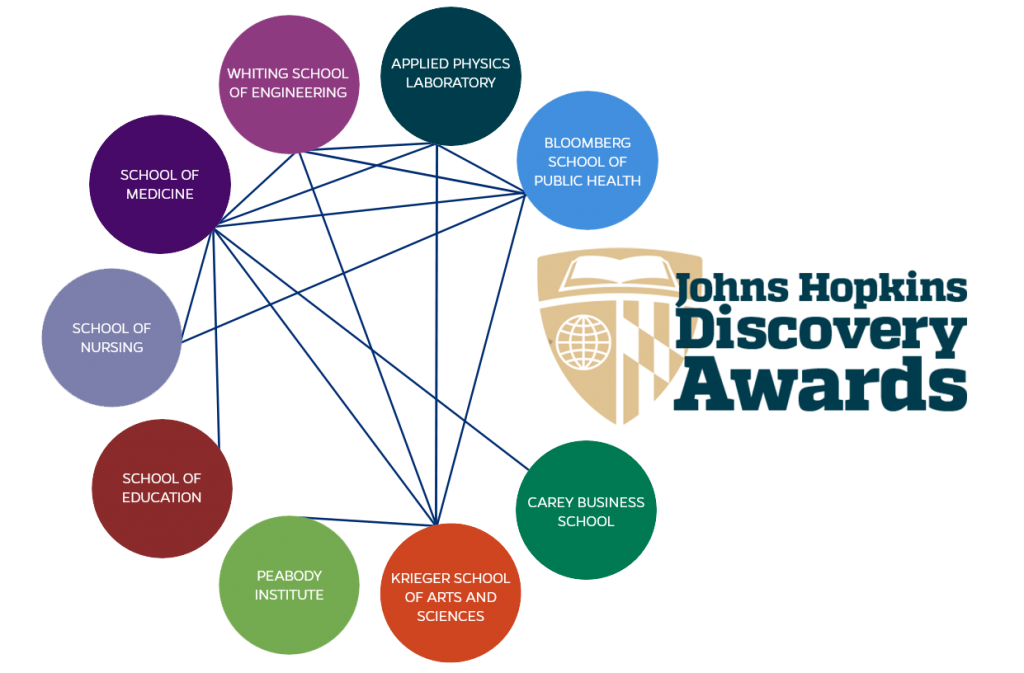
In 2017, 23 Category 1 Discovery Awards and 3 Category 2 Discovery Awards were given to interdisciplinary faculty teams across nine Johns Hopkins divisions. From investigating the use of advanced hydrogels in post-stroke rehabilitation to filming the first documentary about women conductors to determining whether metadata from mobile phones can be used to monitor demographic trends—such as births and deaths—in low- and middle-income countries, these Discovery Awards are solving complex problems and expanding the horizons of knowledge.
A new generation of models for rapid and conditional inactivation of proteins in stem cells and mice – Philip Jordan (Public Health) & Andrew Holland (Medicine)
Anomaly Detection for Zero Shot Learning with Applications to Rare Myopathic Disease Diagnostics – Mauro Maggioni (Arts & Sciences, Engineering), Philippe Burlina (Applied Physics Lab), I-Jeng Wang (Applied Physics Lab) & Jemima Albaya (Medicine)
Auricular Point Acupressure: Examining the Scientific Underpinnings of Chemotherapy-Induced Peripheral Neuropathy Relief – Chao Hsing Yeh (Nursing), Claudia Campbell (Medicine), Thomas Smith (Medicine), Gary Gong (Medicine) & Nancy Perrin (Nursing)
Computational Design of High-Resolution Protein Crystals to Reveal Biomolecular Mechanisms – Jeffrey Gray (Engineering), Bertrand Garcia-Moreno (Arts & Sciences) & James Berger (Medicine)
Decoding the Effect of Incident Acoustic Waves on the Flight of Mosquitoes – Rajat Mittal (Engineering), Anthony Cammarato (Medicine), George Dimopoulos (Public Health) & Christopher Potter (Medicine)
Development of a maternal early warning trigger tool for early recognition of severe maternal morbidity – Andreea Creanga (Public Health), Edith Gurewitsch-Allen (Medicine) & Ayse Gurses (Medicine)
Efficient search and its implications for patenting of inventions – Roman Galperin (Business) & Marshall Hussain Shuler (Medicine)
Engineering plasticity after stroke to promote recovery using peptide π-electron hydrogels – Ryan Felling (Medicine), Steven Zeiler (Medicine) Hai-Quan Mao (Engineering) & J.D. Tovar (Arts & Sciences)
Hiding in the Fat: How Trypanosomes Exploit the Adipose Tissue Microenvironment – G. William Wong (Medicine) & Monica Mugnier (Public Health)
Local Immunotherapy with Tumor-Penetrating Hydrogels – Honggang Cui (Engineering) & Fengyi Wan (Public Health)
Long-Read Sequencing Technologies for Precision Pharmacogenomics – Kathleen Burns (Medicine) & Christopher Bradburne (Applied Physics Lab)
Mapping Chromosomal Organization by single-cell in-situ sequencing – Jie Xiao (Medicine), Xin Chen (Arts & Sciences) & Taekjip Ha (Arts & Sciences/Engineering/Medicine)
Metagenomic Sequencing for Diagnosis of Infections – Steven Salzberg (Medicine/Public Health/Engineering), Carlos Pardo (Medicine), Charles Eberhart (Medicine), Cynthia Sears (Medicine), Patricia Simner (Medicine) & Karen Carroll (Medicine)
Monitoring Demographic Trends in Low- and Middle-Income Countries from Mobile Phone Metadata – Stephane Helleringer (Public Health), Ian McCulloh (Applied Physics Lab), Joanne Katz (Public Health) & Alain Labrique (Public Health)
Novel high-throughput screening system for cardiac tissue – Narutoshi Hibino (Medicine) & Yun Chen (Engineering)
Optoacoustic based Intrapartum Fetal Brain Monitoring to Prevent Hypoxic-Ischemic Encephalopathy – Ernest Graham (Medicine), Ray Koehler (Medicine) & Emad Boctor (Engineering)
Real-Time Laser-Tissue Interaction Assessment and Control Using Speckle Variance Optical Coherence Tomography – Mary Sheu (Medicine), Jin Kang (Engineering), & Sewon Kang (Medicine)
Resolving transcriptome architecture using single molecule direct RNA sequencing – Winston Timp (Engineering), James Taylor (Arts & Sciences/Engineering) & John Kim (Arts & Sciences)
The effects of social and behavioral outcomes on the mechanisms of early childhood obesity in American Indian children – Summer Rosenstock (Public Health) & Rexford Ahima (Medicine/Public Health)
Towards an epidemiology of vision: Developing a platform for population-based visual psychophysics – Robert Wojciechowski (Public Health), Ernst Niebur (Medicine) & Howard Egeth (Arts & Sciences)
Uncovering Trajectories of Opioid Use: Formative Research for Effective Interventions – Shannon Frattaroli (Public Health), Eric Strain (Medicine), Renan Castillo (Public Health), Elise Omaki (Public Health) & Wendy Shields (Public Health)
Virtual Training to Increase Pediatric Provider Self-efficacy and Skill in Intrauterine Device Placement: Continuing Education Without Compromising Patient Safety – Maria Trent (Medicine), Anne Burke (Medicine) & David Peloff (Education)
“We Conduct” – the first documentary film about women conductors – Bernadette Wegenstein (Arts & Sciences) & Marin Alsop (Peabody)
New Approaches for Defining the Role of Neuromodulation in Brain Networks: Building a Collaborative JHU Team for NIH Conte/BRAIN Initiative Funding – Patricia Janak (Arts & Sciences/Medicine), Dwight Bergles (Medicine), Marshall Hussain Shuler (Medicine) & Jeremiah Cohen (Medicine)
Uncovering Poly(ADP-ribose) Biology in Non-membranous Structures – Anthony Leung (Public Health), Sua Myong (Arts & Sciences) & Marc Greenberg (Arts & Sciences)
Targeting the Mechanobiome of Pancreatic Ductal Adenocarcinoma – Douglas Robinson (Medicine), Robert Anders (Medicine), Caren Freel Meyers (Medicine), Pablo Iglesias (Engineering), Elizabeth Jaffee (Medicine) & Lei Zheng (Medicine)
Vice Provost for Research
265 Garland Hall
3400 North Charles Street
Baltimore, MD 21218
(443) 927-1957
